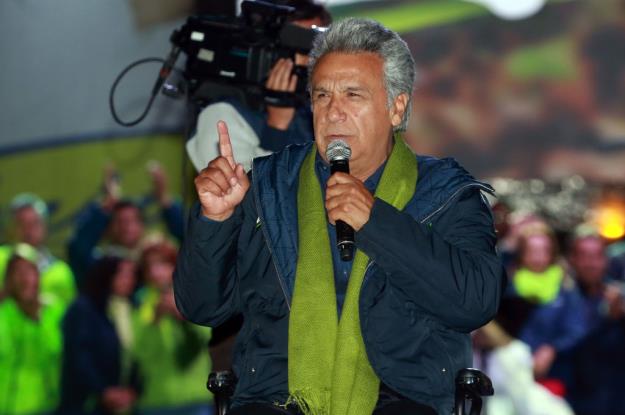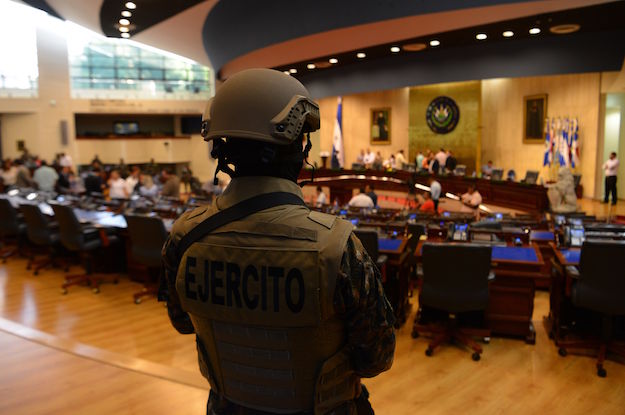As vice president of Ecuador, Lenín Moreno was always a loyal number two to Rafael Correa – able to forge a more conciliatory style than his polarizing mentor, but adroit enough to avoid targeting the president with even implicit criticism.
No wonder then that when he termed out earlier this year, Correa anointed Moreno as his replacement ahead of presidential elections last February. Most expected Moreno to be a caretaker who would dutifully step aside to allow Correa’s triumphant return to the Carondelet, the presidential palace in Quito, in 2021.
Political miscalculations do not get much bigger than that.
Earlier this month, with his approval ratings touching 80 percent, Moreno announced plans for a constitutional plebiscite that will include a proposal to limit presidential re-election – a move that would bar Correa from ever leading the Andean nation again.
The plebiscite, expected to be held in the first quarter of 2018, is just the latest chapter in a spectacular falling out between Moreno and his combustible and, critics say, authoritarian predecessor. The dispute is having profound consequences for Ecuador, including moving it out of Venezuela’s orbit and back in line with Latin America’s democratic mainstream.
On a personal level, the antagonism between Correa and Moreno could hardly be more bitter.
Moreno has accused Correa of bugging his office, questioned his ruling style and warned that he has an “obsession” with power. Correa has responded by saying that Moreno “cheated” him, is a “wolf in sheep’s clothing,” and should resign “not for being bad but for being ridiculous.”
But whether Correa likes it or not, Moreno is already ringing in changes in Ecuador, even as he maintains the populist leftist’s commitment to addressing inequality through wealth redistribution.
After taking office in May, Moreno reached out to Ecuador’s large indigenous minority, which had grown deeply hostile to Correa over his promotion of mining and oil drilling in the Amazon. Moreno also green-lighted corruption investigations into his predecessor’s inner circle, resulting in the arrest of Correa loyalist Jorge Glas, the man who succeeded him as vice president.
Then, the new president did something unthinkable for most Correa sympathizers: He condemned the Maduro regime in Venezuela for using violence against democracy protesters, and even replaced Quito’s ambassadors in Caracas and Havana for supposedly being too close to their host governments.
That represents a seismic shift in Ecuador’s international alignments. Under Correa, Ecuador had been routinely antagonistic to the U.S., to the point of providing refuge to Wikileaks founder Julian Assange in the Ecuadorean embassy in London.
On the domestic front, Moreno has also reversed course on one of the hallmark tactics of his predecessor: repression of the media.
Correa persecuted Ecuadorean journalists to such an extent that rights groups sometimes categorized them as the least free in the Americas, outside Cuba.
Moreno, by contrast, has invited editors for friendly meetings in the Carondelet, praised the role of the fourth estate in exposing corruption, and largely stopped enforcing Correa’s Communications Law, which had been used to punish even newspaper cartoonists who strayed out of line.
One person giving the changes a guarded welcome is César Ricaurte, who heads Fundamedios, a media think tank that Correa once attempted to shutter. “There is a change, an evident improvement in the media climate,” Ricaurte said.
Yet Moreno still has his work cut out to consolidate himself in power. His socialist Country Alliance (Alianza País) party has a majority in the single-chamber national assembly, but is deeply split between Correa loyalists and reformists. The judiciary is also still largely controlled by the former president, as are many other public institutions. Moreno’s task has also been complicated by Ecuador’s precarious economic situation. With the country dependent on oil sales, particularly to China, falling prices saw GDP actually shrink 1.5 percent in 2016.
Moreno claims that Correa disguised how dire the situation was. During the Correa years, Ecuador assumed a reported $27 billion of debt. But Moreno now warns that the true figure could be as high as $40 billion.
Ramiro Crespo, a Quito-based investment analyst, agrees that some economic indicators appear to have been massaged and that Moreno will have to oversee a national belt-tightening, even as he pursues “social justice but with all the advantages of a functioning market.”
“Moreno was basically expected to keep the seat warm for Correa,” Crespo told AQ. “He was also expected to take the blame for the bad economic news. Whether he wants to be a democrat or a dictator, he is going to have to navigate the economic problems.”
Any significant cuts to public spending are likely to be delayed until after the plebiscite. Some 75 percent of Ecuadoreans are in favor of the vote taking place. But whether that actually translates into approval for constitutional amendments that would bolster Moreno and block Correa’s return to power remains to be seen.
For now, after a turbulent decade with Correa at the helm, most Ecuadoreans appear happy with a continuation of his populist economic approach – but without the deep political divisions in which he often appeared to revel.
—
Tegel is a journalist based in Lima, Peru








